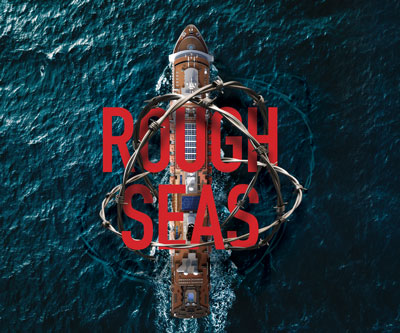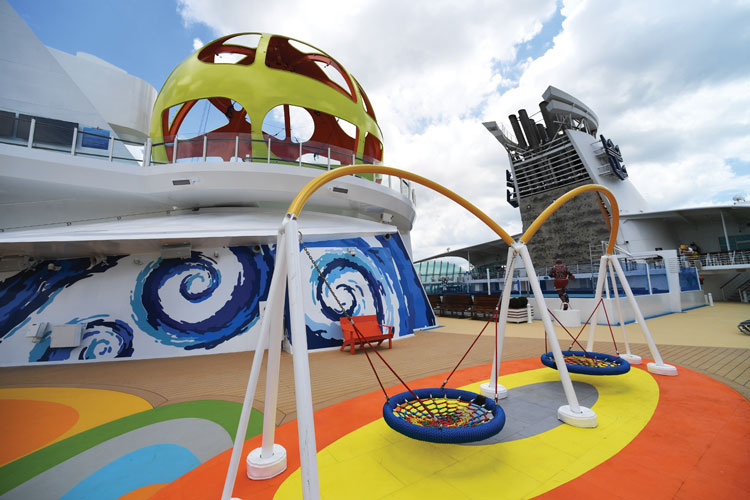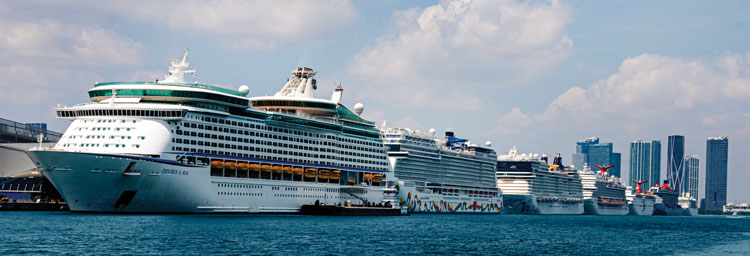Suing a cruise line? There are a boatload of challenges unique to the industry

Photo illustration by Elmarie Jara/Getty Images
Nestled between a colorful tangle of waterslide tubes and a wave-generating surfing simulator, the enormous yellow orb of the Sky Pad rose from the deck of Royal Caribbean’s Mariner of the Seas cruise ship like a “go” button waiting to be pressed.
The Sky Pad combined trampoline bouncing with bungee jumping, allowing those who entered its cavernous circular structure to defy gravity with every bounce. Optional virtual reality headsets let guests smash and speed through simulated candy landscapes and futuristic city streets while they jumped. The Sky Pad was just one of many high-octane attractions Royal Caribbean added to its 3,800-plus passenger Mariner of the Seas ocean liner during its $120 million makeover in 2018.
Casey Holladay remembers seeing a Royal Caribbean TV commercial promoting the new Sky Pad ride. An avid outdoorsman and sports enthusiast, Holladay, then age 25, recalled to an NBC 6 Miami news team that seeing the commercial made him excited to try this “awesome experience in the sky” during an upcoming Royal Caribbean cruise to the Bahamas with his girlfriend. And that’s exactly what he set out to do after they boarded the Mariner of the Seas in February 2019.
Holladay’s Sky Pad experience started off just as awesome as he had imagined. With his girlfriend recording him on her phone from the deck, Holladay bounced, twisted and soared against a background of clear blue sky. Suddenly, however, the unthinkable happened: The bungee cords holding Holladay snapped and spiraled away from him, sending him into a 20-foot free fall to the deck below.

An accident last year on the Sky Pad attraction on the Mariner of the Seas cruise ship (above) prompted a $10 million personal injury lawsuit against Royal Caribbean. Photo by MyLoupe/Universal Images Group via Getty Images; Jim Rassol/Sun Sentinel/Tribune News Service; Nora Tam/South China Morning Post via Getty Images
“I just felt the momentum release from my body that I wasn’t being held by anything anymore,” he told the news reporter. “All I really remember was the hit, and the noise, and then the fear.”
The fall caused Holladay to shatter his pelvis, and he sustained other injuries. He was hospitalized for nine days, had surgery and sustained permanent injuries that will require follow-up care for years, says his lawyer, Miami’s Brett Rivkind of Rivkind Margulies & Rivkind.
Holladay is suing Royal Caribbean for $10 million. Royal Caribbean did not return an email for comment, but in its answer to the lawsuit, the company denied liability and has requested a jury trial.
Holladay isn’t the only cruise ship passenger to have a dream vacation turn into a nightmare. In 2019 alone, heart-wrenching news reports involving cruise ships included the death of a toddler who fell out of an open ship window to the concrete dock below during a family cruise to Puerto Rico; an alcohol-fueled brawl on a cruise of Norwegian fjords that caused multiple injuries; the alleged rape of a 17-year-old British girl during a Mediterranean cruise; and the death of an Australian man who went overboard during a Caribbean cruise with his family.
But tragedies don’t just happen on board. Cruise ship passengers can be injured, attacked or killed on land, too, during shore excursions sold by the cruise lines that take place while the cruise ship is docked in a port.

Photo by Jeffrey Greenberg/Education Images/Universal Images Group via Getty Images
Excursions can range from exclusive parties and island bus tours to extreme adventures such as parasailing, hang gliding and bungee jumping. Cruise ships have been sued in connection with a party held at a local bar that left a cruise ship passenger a tetraplegic, a deadly crash involving a tour bus filled with cruise ship passengers, and a fatal midair zip line collision between a husband and wife on their honeymoon cruise.
But when a cruise ship departs from a U.S. port, federal maritime law generally applies. Under maritime law, tort liability for injuries, illnesses and death is anchored by basic principles of negligence law requiring a duty to protect against a particular harm, a breach of that duty, proximate cause between the breach and the harm, and actual harm. But that’s where plaintiffs lawyers say the basic legal theories end and the complications begin.
Bringing a case against an ocean cruise line is challenging. Together, the industry’s big three—Carnival Corp., Royal Caribbean Cruises and Norwegian Cruise Line Holdings— carried nearly 80% of all ocean cruise passengers, according to a 2018 report. Plaintiffs lawyers say these cases are highly specific and highly specialized, governed by myriad legal standards and subject to investigative challenges. It’s an area so unique, they say, that it’s easy for a novice lawyer to make an honest mistake that can permanently sink an otherwise meritorious case.
“There are different standards of proof, shorter statutes of limitations and more opportunities to get yourself in trouble,” says Deborah J. Gander, a partner at Colson Hicks Eidson in Coral Gables, Florida.

Deborah J. Gander: “There are different standards of proof, shorter statutes of limitations and more opportunities to get yourself in trouble.” Courtesy of Colson Hicks Eidson
Tonya J. Meister of Meister Law Firm in Miami agrees. “If you don’t know what you’re doing,” warns Meister, who is board-certified by the Florida Bar in maritime law, “you’re going to harm your client and make bad law.”
Carnival, Royal Caribbean, Norwegian and Princess Cruises (acquired in 2003 by Carnival) did not respond to repeated requests for comment on this story.
Laws and limitations
The cruise industry is international. Ships are registered under flags of foreign countries and operated by companies incorporated in other foreign countries. Passengers and crew hail from points around the world and travel together to all points in between. So how do plaintiffs lawyers know where to file a lawsuit involving a cruise ship departing from an American port? It’s actually pretty simple: They look at the passenger’s cruise ticket.
All ocean cruise passenger tickets contain pages of fine print making up an extensive contract limiting the cruise line’s liability for everything from lost luggage to class action lawsuits. Included in this extensive laundry list of restrictions and responsibilities is a forum selection clause requiring all civil suits against the cruise line to be brought in a particular court. Booking the cruise and paying for the ticket is considered the passenger’s consent to the terms of the contract.
Tickets issued by Carnival, Royal Caribbean and Norwegian require passengers to file any civil case in the Southern District of Florida, a venue that encompasses Miami-Dade County. The reason, Gander says, is obvious: “While the major cruise lines are incorporated outside of the country, every executive of every major cruise line is headquartered in Miami, so it’s really a home-field advantage for these corporations.”
It may seem unfair to require plaintiffs to bring their lawsuits in a forum chosen by the defendant, especially when the forum choice was clearly made for the convenience of a defendant corporation rather than the convenience of an aggrieved person, who most likely lives far away. Nevertheless, the U.S. Supreme Court has upheld cruise line forum selection clauses, most recently in the 1991 case Carnival Cruise Lines Inc. v. Shute. In that case, the high court ruled that the choice of Florida as a forum is not fundamentally unfair, and that the chosen Florida forum would neither deter passengers from pursuing a legitimate claim nor deprive them of access to a competent court.
The cruise passenger ticket also imposes its own statute of limitations on passenger claims. Maritime law generally provides a three-year statute of limitations for tort actions. When the tort involves a cruise ship, however, the passenger ticket terminology typically reduces the statute of limitations to just one year, with a notice requirement set at six months. As with the forum selection clause, courts have consistently upheld the validity of such restrictions where they are clearly stated and passengers have had the opportunity to read them, regardless of whether they have actually done so.
Plaintiffs lawyers say the law doesn’t make their job easy. Michael Winkleman of Miami’s Lipcon, Margulies, Alsina & Winkleman says the requirement to file within one year can complicate damages calculations such as determining the total amount of medical bills or assessing the extent of lasting injury. “Sometimes, we just have to file the case while the plaintiff is still undergoing medical treatment or recovering,” he says.
Meister says she’s even seen instances where the shortened statute of limitations has precluded cases entirely. The most common scenario is a passenger who’s injured on a cruise ship and decides to consult a local personal injury lawyer back home who doesn’t know about the shortened filing window. “I get a lot of phone calls from unfortunate souls who thought they had a regular injury claim and didn’t know they needed to give written notice within six months and file a suit in federal court within a year,” she says. “There’s nothing I can do to help them—they’ve blown it.”
Building a case
When bringing a cruise ship personal injury case, lawyers say it’s not just the law that’s different, it’s the investigative approach, too.
“When you have a car accident or a fall in a supermarket, you can easily just go down and investigate the scene,” Winkleman says. “But I can’t just go walk onto a cruise ship: I have to get clearance to have access, and generally that doesn’t happen unless I have already filed the lawsuit.”
Although Winkleman is based in Miami, it doesn’t necessarily mean the cruise ships he wants to inspect are there, too. Which means he must go wherever the ship is currently docked to be able to conduct his onboard investigation.

Michael Winkleman: “Sometimes, we just have to file the case while the plaintiff is still undergoing medical treatment or recovering.” Photo courtesy of Lipcon, Margulies, Alsina & Winkleman
Interviewing witnesses poses additional challenges, especially if the witnesses also happen to be crew members, Winkleman says. “The dynamic is, you have a lot of crew members from Third World countries where they would be making $1 a day, but on a cruise ship, they make $100 a day, so they are going to say whatever they have to in order to keep their jobs. Even the security guards have an interest in protecting the company—it’s an immediate adversarial relationship.”
But the challenges don’t disappear even when crew members cooperate, Rivkind says. Scheduling depositions of cruise ship employees can be especially challenging, he says, “because they’re on cruise ships that are moving from port to port.”
While the hurdles are many, Ira H. Leesfield, a partner at Miami’s Leesfield Scolero, points out one significant advantage when it comes to proving a case: cameras. “There are surveillance cameras everywhere on cruise ships,” he says. “A lot of times, we get the judge to force the surveillance, and we’ll have the incident right there on tape.”
There’s also digital data that can help a lawyer make a case, says Miami solo Robert L. Gardana, who has chaired the Florida Bar’s Admiralty Law Committee and served as chair of the admiralty law committee of the ABA’s Tort and Trial Lawyer Insurance Practice Section. Data from a ship’s GPS and automatic identification system—a maritime tracking system that shows the location of nearby vessels—can be critical, he says.

Photo courtesy of Robert L. Gardana
But Gardana stresses the importance of old-school document sleuthing, too, via the Freedom of Information Act request. Topping his must-request list: the FD-302 form used by FBI agents to summarize and make notes on interviews they conduct. “Often, the FD-302 form can help piece the puzzle together,” he says.
Investigating cases of sexual assault on cruise ships also has gotten easier thanks to the passage of the Cruise Vessel Security and Safety Act of 2010. The act established standards for crime scene preservation and required medical exams for victims that include evaluating the patient for trauma and preserving medical evidence. It also created an online database of cruise ship incident reports to make crime statistics accessible to the general public. Prior to 2010, foreign-flagged cruise lines were not required to report sexual or physical assaults to any U.S. government agency.
The importance of such statistics was recently reinforced in K.T. v. Royal Caribbean Cruises Ltd. In this case, a minor female alleged she was gang raped in 2015 by a group of men who plied her with alcohol served by ship bartenders. She became “obviously drunk, disoriented” and “unstable” in full view of crew members and those monitoring security cameras. The July 2019 opinion by the Atlanta-based 11th U.S. Circuit Court of Appeals, written by Chief Judge Ed Carnes for a three-judge panel, reversed the lower court’s dismissal of the case for failure to state a claim for negligence in failing to warn cruise ship passengers of the danger of sexual assault and failing to take action to prevent the assault.
But Carnes didn’t stop there. He also wrote a special concurrence to his own opinion where he took judicial notice of the Department of Transportation cruise line incident reports compiled pursuant to the Cruise Vessel Safety and Security Act of 2010 that included incidents that occurred on past Royal Caribbean cruises. “It would be absurd to suggest that a multibillion-dollar business like Royal Caribbean was not aware of congressional reports about the problem of sexual assault aboard its cruise ships,” he wrote.
Winkleman, who represents K.T., believes the opinion “provides a critical clarification of the law that cruise ships do have a duty to warn passengers of the risk of rape.”
Royal Caribbean did not respond to a request for comment on the case.
Restrictions on recovery
When it comes to damages for deaths, plaintiffs lawyers are united in their frustration with the Death on the High Seas Act, an admiralty law that governs the who, the how and the how much when a death occurs during a cruise beyond U.S. territorial waters.
Signed into law by President Woodrow Wilson in 1920, DOHSA was originally intended to benefit widows and dependents of seamen who died while working on ships in international waters as a result of negligence, a wrongful act or unseaworthiness.
DOHSA applies to transportation passenger deaths that occur 3 or more nautical miles from the shore of the United States or in a foreign country. For cruise ship passengers, it is the exclusive applicable law, preempting both state law and maritime common law.
But DOHSA significantly restricts the amount and type of recovery that a decedent’s family can receive, no matter the amount of pain or suffering or the level of negligence or egregious conduct that caused the death. DOHSA only allows a family to recover pecuniary losses like funeral expenses, medical expenses and loss of inheritance.
Nonpecuniary losses such as the loss of care, comfort and companionship are specifically prohibited. That means there is no opportunity to recover for emotional distress, mental anguish, grief or the loss of consortium. DOHSA also prohibits any compensation for pain and suffering the decedent experienced before dying.
“One would think a death case would be a high-value case, but if it’s a death on the high seas, the claim can be worth peanuts,” Meister says.

Tonya J. Meister: “One would think a death case would be a high-value case, but if it’s a death on the high seas, the claim can be worth peanuts.” Photo by Eileen Escarda
But DOHSA is even more restrictive in its application to pecuniary recovery, Meister explains, because it calls for a different calculation for the value of life than is common in death cases on land and in territorial waters. Instead of simply calculating the loss of earnings, DOHSA calculations are based on the loss of net accumulation.
“It’s not what the total of what you were expected to earn over your estimated lifespan; it’s what you would have had left after you spent down your earnings,” she says.
If the passenger who dies is an older retired person who does not happen to be financially supporting anyone, Winkleman says that recovery could very well be limited to just funeral expenses.
Meister points out that it is possible to recover for emotional distress under DOHSA if the decedent’s spouse, child or parent was in the “zone of danger” when the death occurred. Merely witnessing a loved one die is not enough, she says, even if the situation is horrific, such as in the case of a medical emergency or an accident during an excursion. Rather, the claimant must be imperiled by the same danger or the same situation that causes the death of the loved one. “If you don’t have that, you don’t have a case,” she says.
In 2000, Congress acknowledged that DOHSA’s pre-World War II-era compensation model was outdated and amended it to allow for nonpecuniary recovery and to extend the jurisdiction from 3 to 12 miles off the country’s shore. Unfortunately for cruise ship passengers, however, the amendment applies only to commercial aviation passengers—a direct result, many plaintiffs say, of cruise industry influence.
“Any time there’s an effort to provide any fix, the pocketbook opens up,” Winkleman says. “They spend millions trying to keep DOHSA on the books, which, in my opinion, is money very well spent.”
In April 2019, U.S. Sen. Deb Fischer (R-Neb.) introduced a bill called Hammer’s Law to extend DOHSA’s updated provisions to cruise ship passengers.
The name is in honor of Christy and Larry Hammer, who died in a fire that broke out in their cabin during a riverboat cruise in Peru. A subsequent report from the Peruvian navy found multiple incidents of negligence by the cruise company, according to the senator’s press release.
The bill has a long road to becoming law, but precedent does not bode well for its success. The proposed Cruise Passenger Protection Act of 2017, which would have provided similar relief by requiring a uniform application of DOHSA, died in subcommittee at the close of 2018.
“Do I think it’s likely that it will be amended? I’m not holding my breath waiting,” Davies says. “The cruise lines are a powerful lobbying group against change, and the lobby group for change—the families of deceased passengers—is less organized and less powerful.”
As a result of DOHSA’s rigid restrictions, plaintiffs lawyers say they’ve been forced to turn away meritorious cases because the recovery wouldn’t be enough to justify the time and resources necessary to bring a claim.
“The genesis of this law was to promote American maritime commerce, not to give a ‘get out of jail card’ to the cruise lines,” Winkleman says. “This law is a nightmare, and it shouldn’t be on the books anymore.”
Despite the restrictions, plaintiffs lawyers say they’re willing to rise to the challenge on behalf of their clients, and that’s what makes it worth it.
“The cruise lines fight very hard, they have very smart lawyers both in-house and as outside counsel, and they don’t pay money to get rid of cases,” Meister says. “We try a lot of cases, and we settle a lot of cases; it just depends on the circumstances. In my experience, most cases settle, but I am always 100% ready for trial.”
See also: Coronavirus on board: Lawyer’s parents were trapped on a contaminated cruise ship
This article appeared in the June/July 2020 issue of the ABA Journal under the headline: “Rough Seas: Plaintiffs attorneys suing cruise lines must navigate a boatload of challenges unique to the industry.”
Correction
In print and initial online versions of "Rough Seas," June-July, Robert L. Gardana should have been identified as a past chair of the Admiralty and Maritime Law Committee of the ABA’s Tort and Trial Lawyer Insurance Practice Section.The Journal regrets the error.
Jenny B. Davis, a former practicing lawyer, is a freelance writer based in Fort Worth, Texas.



